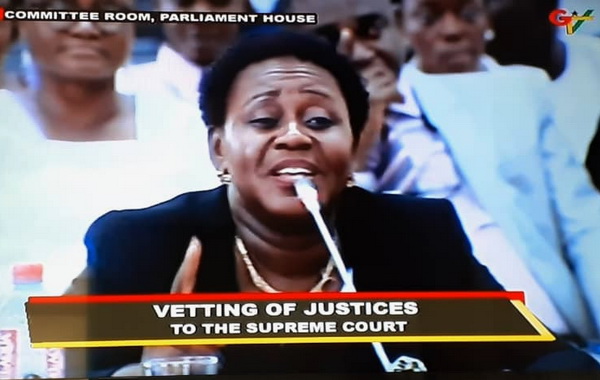
Corruption: Judge calls for robust national conversation
Court of Appeal Judge, Justice Gertrude Torkornoo has advocated for a more robust national conversation on corruption.
She says the issues of corruption in Ghana have been loosely handled and need to be properly homed in for a national direction.
The president’s nominee for the Supreme Court made the suggestion on Tuesday at her vetting by Parliament’s Appointments Committee.
She was responding to a question by the Member of Parliament for Asokwa in the Ashanti region, Madam Patricia Appiagyei, who said there appeared to be smuggling in into Ghanaian values, foreign practices that were considered alien. She said for example that in certain jurisdictions, giving tips after a service is mandatory, while others prohibit it.
Justice Gertrude Torkornoo who is the last of three nominees by President Akufo-Addo for the Supreme Court, agreed with the MP.
“I really share this view. I think that because of the way our cultural practices are, we have to have a more robust conversation about what is corruption, especially when you take out the criminal part of it – that part that is defined under the ethical codes of various professional bodies, and the general practices. We need to think through these and respond to them actively else we are allowing the conversation to float around too much without coming to grips with it, and I don’t think it’s too healthy for all of us.”
She had earlier agreed with the Member of Parliament for North Tongu in the Volta region, Samuel Okudzeto Ablakwa that the most recent Afrobarometer survey on Ghanaians’ perception of corruption in the judiciary was not good at all and required urgent attention.
Justice Gertrude Torkornoo also responded to another question on corruption by Minority Leader and MP for Tamale South, Haruna Iddrisu, to do with gift giving and their nature to corrupt or be misconstrued as a bribe.
The Supreme Court nominee said given the nature of their work, members of the judiciary should refrain from accepting gifts altogether, safe from perhaps one’s own child or immediate family member.
“… Beyond a very close circuit, make it your practice to stay away from gifts altogether because of the judicial function. That is the situation with the judiciary for instance, so I think every institution should do that assessment. Perhaps CHRAJ should help every institution to do that assessment and formulate that because of the structure of their work. I think that you cannot put judges in the same context as politicians, they are different people and have different functions and so if we deliberately think about every context and formulate codes for every context, we will be doing ourselves a lot of good.”
The Afrobarometer survey, issued by the Ghana Center for Democratic Development, made a number of findings on a variety of issues. On corruption in particular it made the following key findings.
Key findings
- Among key public officials in Ghana, the police, judges and magistrates, Members of Parliament, civil servants, and tax officials are most widely perceived as corrupt (Figure 1). But perceived corruption among the police has declined slightly compared to 2017.
- The Army, religious leaders, and the presidency are the most trusted public institutions (by 72%, 63%, and 58% who say they trust them “somewhat” or “a lot”), while opposition political parties (37%), local government officials (38%), and tax officials (39%) are least trusted (Figure 2).
- More than half (53%) of Ghanaians say corruption in the country has worsened “somewhat” or “a lot” during the year preceding the survey, a 17-percentage-point increase compared to 2017. This follows a huge (47-percentage-point) improvement between 2014 and 2017 (Figure 3).
- The police are the institution that the largest number of citizens report bribing to access services. Among those who had contact with key public services during the previous year, four in 10 say they paid a bribe to avoid problems with the police (42%) or to obtain police assistance (39%) (Figure 4).
- Six in 10 Ghanaians (61%) believe they risk retaliation or other negative consequences if they report incidents of corruption. Only one-third (34%) say they can report corruption without fear of retaliation (Figure 5).
- Compared to 2017, there has been a 27-percentage-point drop in popular approval ratings of the government’s performance in fighting corruption – a dramatic reversal of earlier gains. Only a minority (40%) say the government is doing a “fairly” or “very” good job (Figure 6).
